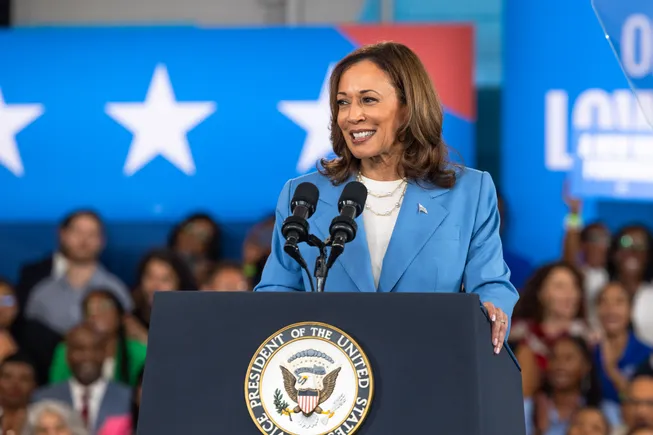Dive Brief:
- Vice President Kamala Harris promised a federal ban on food price-gouging as part of proposed economic policies she revealed in a Friday speech for her presidential campaign.
- Harris said her “first-ever” federal ban would include “new penalties for opportunistic companies that exploit crises and break the rules.” She did not provide further details.
- FMI – The Food Industry Association took aim at price-gouging claims while the National Grocers Association called for stronger enforcement of the Robinson-Patman Act, an antitrust law that prohibits price discrimination in commerce.
Dive Insight:
Harris said that a grocery price-gouging ban would help the food industry become more competitive, adding that, if elected president, her administration would support smaller food businesses “that are trying to play by the rules and get ahead.”
“We all know that prices went up during the pandemic when the supply chains shut down and failed, but our supply chains have now improved and prices are still too high. … Many of the big food companies are seeing their highest profits in two decades, and while many grocery chains pass along these savings, others still aren’t,” Harris said.
In July, food-at-home prices rose at a 1.1% annual rate while inflation increased 2.9% — its lowest level on an annual basis since March 2021, according to Consumer Price Index data released Wednesday by the U.S. Bureau of Labor Statistics. Even as grocery inflation has slowed in recent months, consumers have continued to worry about food costs.
Harris pointed to her previous experience as California’s attorney general prosecuting companies for illegal price hikes: “So believe me, as president, I will go after the bad actors.” The grocery price-gouging ban is one of several economic policies, including increased construction of new housing, expanded child tax credits and lowered drug costs, Harris is proposing.
The NGA, which has led a crusade against what the group says are “unfair and discriminatory tactics” by large food retailers and suppliers that hurt independent grocers, criticized Harris’ proposal.
“The proposal calling for a ban on grocery price gouging is a solution in search of a problem,” NGA President and CEO Greg Ferrara said in a statement.
The NGA said that instead of proposing new legislation, the government should more strictly enforce the Robinson-Patman Act, lower swipe fees and “rein in excessive and burdensome regulations.”
Amid numerous news reports last week that Harris would share a proposed grocery price-gouging ban Friday, FMI released a statement Thursday saying there are misconceptions about food price inflation and industry practices.
“It is both inaccurate and irresponsible to conflate an illegal activity like price gouging — a defined legal term in which specific violations of trade practices law occur — with inflation, which is a broad, macroeconomic measure of increases in consumer prices over time,” FMI President and CEO Leslie G. Sarasin said in the statement.
FMI said that food retailers’ profit margins are tight — 1.6% last year — and that the industry has worked to keep prices “as low as possible” while grappling with increased labor costs, volatile energy prices, more severe weather events, more regulations and supply chain issues.
Earlier this year, the Federal Trade Commission released a report claiming that revenues have outpaced costs for food and beverage retailers in recent years, suggesting the grocery industry is using inflation to increase profits at the expense of consumers. The FTC also said that large grocery retailers took steps to shield their market power in the face of supply chain disruptions during the COVID-19 pandemic that put smaller retailers at a competitive disadvantage.
The report used publicly available data and responses the agency ordered in late 2021 from nine grocery companies, including Kroger, Walmart, Amazon and C&S Wholesale Grocers.
A White House analysis published at the start of the year found that grocers have maintained the higher profit margins they saw during the pandemic while other types of retailers, like apparel stores, have seen margins slump.

